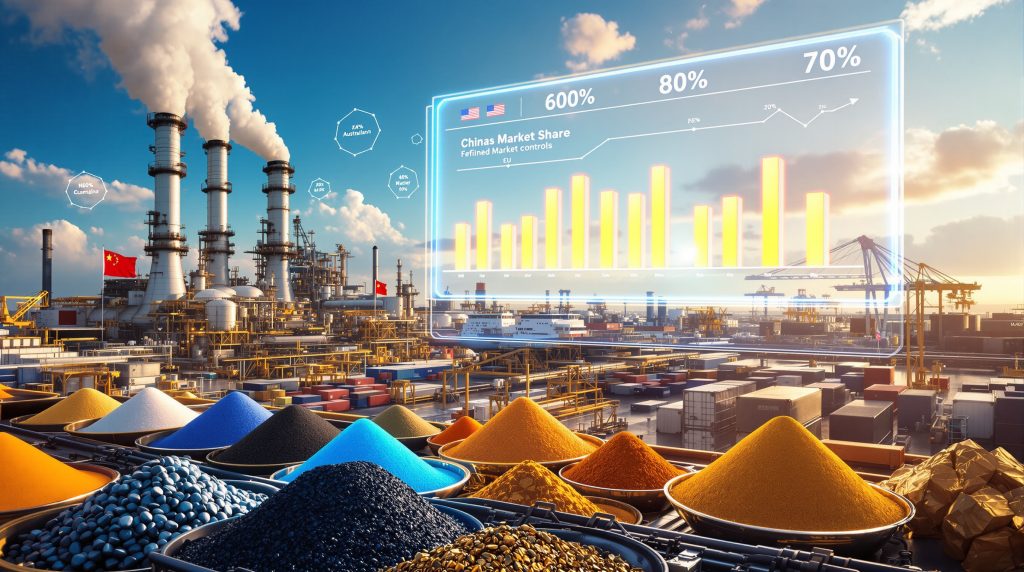China's escalating implementation of export licensing requirements for critical refined metals represents a calculated geopolitical strategy that extends far beyond simple trade policy. These China refined metals export restrictions target materials essential for defense manufacturing, renewable energy infrastructure, and advanced technology production across Western economies.
The strategic implications create what industry analysts describe as a fundamental shift in global supply chain dynamics, with Beijing leveraging its processing dominance to influence international markets and political negotiations. Furthermore, these developments align with broader concerns about critical minerals and energy security in the current geopolitical landscape.
What Refined Metals Are Under China's Export Control Framework?
China's refined metals export restrictions encompass a comprehensive range of materials critical to modern industry and defense applications. The scope of Beijing's control over global processing capacity reveals the extent of Western dependence on Chinese refining operations.
China's Processing Dominance by Metal Category:
| Metal Category | Chinese Market Share | Primary Applications | Control Mechanism |
|---|---|---|---|
| Rare Earth Elements | ~90% | Defense magnets, electronics | Export licensing |
| Graphite (refined) | >90% | Battery anodes, metallurgy | Enhanced scrutiny |
| Cobalt (processed) | <80% | EV batteries, aerospace | Controlled exports |
| Lithium (refined) | ~70% | Battery production, ceramics | Limited licensing |
| Nickel (refined) | ~70% | Stainless steel, batteries | Indirect control |
| Copper (refined) | <50% | Infrastructure, electronics | Market competition |
The October 2025 expansion of rare earth export controls implements enhanced scrutiny on critical minerals used in magnet production, with specific targeting of defense and semiconductor supply chains. This represents a significant escalation from previous restrictions that primarily focused on raw ore exports.
Newly Restricted Strategic Elements
China's latest export control framework now encompasses five additional rare earth elements that were previously unrestricted, creating new vulnerabilities for Western manufacturers:
- Samarium: Essential for high-performance permanent magnets in military applications
- Gadolinium: Critical for MRI contrast agents and neutron detection systems
- Terbium: Required for specialised phosphors and magneto-optical devices
- Dysprosium: Vital for high-temperature permanent magnets in wind turbines
- Lutetium: Used in medical imaging and specialised cancer treatment technologies
These additions specifically target materials with dual-use applications, affecting both civilian technology sectors and defense manufacturing capabilities across Western nations. In addition, these restrictions could significantly impact lithium industry innovations currently being developed across Western economies.
How Do These Restrictions Impact Global Manufacturing Chains?
The implementation of China refined metals export restrictions creates cascading effects throughout global manufacturing networks, particularly in sectors dependent on specialised processing capabilities that exist predominantly in China.
Immediate Supply Chain Vulnerabilities:
Western manufacturers face potential production delays extending from six to eighteen months if alternative sourcing arrangements aren't established rapidly. The concentrated nature of Chinese processing capacity means that disruptions affect multiple industries simultaneously.
Defense Manufacturing Impact:
- Guided missile systems requiring rare earth permanent magnets for precision guidance
- Advanced radar equipment dependent on specialty alloy components
- Secure communication systems utilising refined graphite for electromagnetic shielding
- Electronic warfare systems needing processed rare earths for signal amplification
Technology Sector Disruptions:
- Semiconductor fabrication facilities requiring ultra-pure processed materials
- Electric vehicle battery production facing potential cobalt and lithium shortages
- Wind turbine manufacturing needing high-grade rare earth magnets for efficiency
- Consumer electronics production dependent on refined graphite components
Industry Analysis: Reuters columnist Clyde Russell notes that if China cuts off Western buyers from critical metals, it would cause massive disruption to Western supply chains while simultaneously prompting rapid build-out of new supply and processing facilities across the Western world.
Emerging Two-Tier Market Structure
The continuation of Chinese export restrictions is creating what analysts describe as a bifurcated global market structure with distinct characteristics for different supply chain networks.
Secure Western Supply Chain Development:
- Higher processing costs offset by guaranteed availability during crises
- Government subsidies supporting domestic refining capacity expansion
- Strategic stockpile programmes providing supply security buffers
- Premium pricing structures for non-Chinese refined metals
Chinese-Controlled Supply Network:
- Lower production costs but subject to Beijing's political considerations
- Potential overcapacity risks as Western buyers develop alternatives
- Increased dependence on Belt and Road Initiative partner countries
- Price volatility linked directly to geopolitical tensions and trade negotiations
Consequently, this market fragmentation is also affecting related sectors, as evidenced by recent copper market insights highlighting the broader implications for commodity pricing.
What Makes China's Export Control Strategy Economically Risky?
China's refined metals export restrictions operate under a fundamental economic paradox that industry analysts describe as the "one-shot weapon" theory. The strategy's effectiveness diminishes with repeated implementation, as each restriction accelerates Western investment in alternative supply chains.
The Diminishing Returns Problem:
Reuters columnist Clyde Russell's analysis indicates that the cannon of export curbs can effectively only be fired once in anger. His research demonstrates that repeated threats of China refined metals export restrictions encourage Western nations to bite the bullet and build alternative supply chains, even before actual restrictions are implemented.
According to analysis from the Center for Strategic and International Studies, China's dominance in rare earth processing has given Beijing significant leverage, but this advantage could erode if restrictions prompt accelerated development of alternative supply chains.
Economic Vulnerabilities for China:
- Overcapacity Risk: Chinese refineries currently processing 90% of rare earths, 90%+ of graphite, and 80% of cobalt face potential customer loss
- Technology Transfer Acceleration: Western nations developing competing processing methods with government support
- Market Fragmentation: Creation of parallel supply chains that exclude Chinese suppliers
- Revenue Concentration Risk: Heavy dependence on Western customers for refined metal exports
Processing Infrastructure as Strategic Advantage
Trafigura Chief Executive Richard Holtum emphasised at LME Week in London that processing minerals is more important than mining them, stating that national security cannot be achieved simply by having raw materials in the ground. This perspective highlights why China's processing dominance provides more strategic leverage than raw material reserves alone.
Why Processing Capacity Determines Market Control:
- Raw ore deposits exist globally but require specialised refining infrastructure
- Processing facilities represent decades of technological development and capital investment
- Refined products command significantly higher profit margins than raw materials
- Processing knowledge includes proprietary techniques difficult to replicate quickly
Russell's analysis reveals that raw ores used to make many critical metals aren't necessarily rare or difficult to mine, and Western nations collectively would have adequate supplies. The primary challenge lies in building refining capacity, which could be accomplished quickly during a genuine supply emergency, albeit at high cost.
Moreover, recent developments such as Trump's critical minerals order demonstrate how Western governments are responding to these vulnerabilities through policy initiatives.
Which Countries Are Building Alternative Refined Metal Capacity?
Western nations are implementing comprehensive strategies to reduce dependence on China refined metals export restrictions through domestic processing capacity development and strategic partnerships with allied countries.
United States Strategic Response:
- Defense Production Act funding for domestic rare earth processing facilities
- Strategic partnerships with Canadian and Australian mining companies
- Investment tax credits incentivising critical mineral refining operations
- Emergency stockpile programmes for strategic metal reserves
European Union Processing Independence Programmes:
- Green Deal Industrial Plan targeting processing self-sufficiency by 2030
- Strategic partnerships with African mineral-producing nations
- Research funding for alternative processing technologies
- Regulatory fast-track procedures for critical mineral projects
Australia's Processing Expansion Initiative:
- Rare earth refining facility development in Western Australia
- Lithium hydroxide production capacity expansion programmes
- Government co-investment in processing infrastructure projects
- Technology sharing agreements with Western partners
Government Emergency Response Capabilities
Russell's analysis suggests that in the event of a genuine supply emergency created by China ending exports, Western governments would have no option other than to provide emergency funding, as obtaining new sources of supply would trump financial considerations.
Emergency Acceleration Potential:
- Fast-track permitting procedures reducing development timelines significantly
- Emergency funding eliminating private capital constraints for strategic projects
- Technology sharing agreements accelerating knowledge transfer between allies
- Strategic stockpile releases providing temporary supply buffers during capacity development
For instance, Wood Mackenzie's analysis suggests that while China's export controls create near-term supply chain disruptions, they also accelerate the development of alternative processing capabilities outside China.
How Quickly Can Alternative Supply Chains Be Established?
The development timeline for alternative refined metal processing capacity depends heavily on government support levels and the willingness to prioritise supply security over cost considerations.
Processing Facility Development Timelines:
| Processing Category | Facility Construction | Technology Implementation | Full Production Capacity |
|---|---|---|---|
| Rare Earth Processing | 3-5 years | 2-3 years | 5-7 years |
| Lithium Refining | 2-4 years | 1-2 years | 3-5 years |
| Graphite Processing | 2-3 years | 1-2 years | 3-4 years |
| Cobalt Refining | 3-4 years | 2-3 years | 4-6 years |
Emergency Development Scenarios:
Russell's analysis indicates that with emergency government support and adequate funding, Western nations could build refining capacity quickly during a genuine emergency, though this would obviously come at high cost. Financial considerations would become secondary to supply security requirements.
Acceleration Factors:
- Government guarantees eliminating private sector financial risk
- Emergency regulatory approvals bypassing standard environmental review processes
- Technology transfer agreements with existing processing companies
- Strategic material stockpile utilisation providing supply continuity during construction
Investment Requirements and Economic Implications
The transition away from Chinese refined metal dependence requires substantial capital investment across multiple Western economies, supported by government incentives and strategic planning. However, these developments also present opportunities for improved mineral beneficiation insights in various regions.
Capital Investment Considerations:
- Processing facility construction costs significantly higher than Chinese operations
- Government subsidies necessary to maintain competitive pricing
- Long-term supply contracts required to justify private sector investment
- Strategic stockpile maintenance costs for supply security
What Are the Long-term Implications for Global Metal Markets?
The persistence of China refined metals export restrictions is fundamentally reshaping global commodity markets, creating parallel supply chain systems with distinct characteristics and pricing structures.
Bifurcated Market Development:
Russell's analysis predicts the emergence of a two-tier global system for refined critical metals: a more expensive but secure supply chain for Western consumers and a cheaper Chinese system subject to Beijing's political imperatives.
Western Supply Chain Characteristics:
- Higher processing costs compensated by guaranteed availability during geopolitical tensions
- Government subsidies supporting domestic refining operations despite cost disadvantages
- Premium pricing structures reflecting supply security value
- Strategic stockpile integration providing buffer capacity
Chinese Supply Network Evolution:
- Lower production costs but increasing political risk considerations
- Overcapacity development as Western buyers establish alternative sources
- Greater dependence on Belt and Road Initiative partner countries for customer base
- Price volatility correlated with international political tensions
Investment Sector Implications
The restructuring of global refined metal markets creates distinct investment opportunities and risks across different segments of the resource sector.
Processing Infrastructure Investment Opportunities:
- Western refining facilities commanding premium valuations due to strategic value
- Technology companies developing alternative processing methods
- Mining companies with integrated processing capabilities
- Urban mining and recycling operations targeting critical metal recovery
Market Psychology and Pricing Dynamics:
The threat of China refined metals export restrictions creates persistent premium pricing for non-Chinese supply sources, even when actual restrictions aren't implemented. This psychological factor fundamentally alters commodity market dynamics.
How Should Companies Prepare for Continued Export Restrictions?
Companies dependent on refined metals must implement comprehensive risk management strategies addressing both immediate supply security and long-term strategic planning considerations.
Immediate Risk Mitigation Strategies:
- Strategic inventory buildup of critical refined metals (three to six month supply buffers)
- Multiple supplier relationship development across different geographic regions
- Long-term supply contracts with non-Chinese processing facilities
- Investment in recycling and circular economy initiatives for metal recovery
Long-term Strategic Planning Approaches:
- Vertical integration consideration into processing operations
- Joint venture partnerships with Western refining facilities
- Research and development investment in alternative materials
- Geographic diversification of manufacturing operations to reduce concentration risk
Supply Chain Diversification Implementation
Following Holtum's guidance that processing minerals is more important than mining them, companies and governments are increasingly focusing investment on downstream refining capacity rather than solely on mining operations. His message is increasingly being heeded in Western capitals, with expectations that more funding will be directed toward metals refining, along with subsidies and incentives to maintain existing refineries despite their inability to compete with China at current prices.
Government Policy Engagement Priorities:
- Advocacy for domestic processing capacity development support
- Strategic stockpile programme participation and expansion
- Trade policy coordination with allied nations
- Investment incentive programmes for supply chain resilience projects
Technology and Innovation Focus Areas:
- Alternative material development reducing refined metal dependence
- Processing efficiency improvements lowering production costs
- Recycling technology advancement increasing recovery rates
- Automation implementation reducing labour cost disadvantages
Understanding Market Dynamics and Future Scenarios
The evolution of China refined metals export restrictions represents a fundamental shift in how critical materials markets operate, with implications extending beyond immediate supply considerations.
Political Dynamics Driving Restrictions:
China is engaged in complex trade negotiations with US President Donald Trump, with both sides making threats to use available leverage to improve negotiating positions. The problem for Beijing is that repeated implementation of export restrictions on critical minerals encourages Western investment in alternative supply chains.
G-7 Coordination Response:
US Treasury Secretary Scott Bessent is seeking G-7 coordination on responding to China's rare earth restrictions, with plans to seek wider support beyond the G-7 framework. This multilateral approach aims to create unified Western response strategies.
Geological and Technical Considerations
Raw Material Availability Analysis:
The raw ores used to manufacture many critical metals aren't necessarily rare or difficult to mine, and Western nations collectively possess adequate reserves. The challenge lies in processing infrastructure development rather than raw material access.
Processing Technology Factors:
- Chinese processing facilities benefit from decades of technological development
- Environmental regulations in Western countries increase processing costs
- Labour cost advantages in China create competitive pricing pressures
- Energy costs significantly impact refining operation economics
Quality and Grade Considerations:
- Chinese processing facilities optimise for specific grade requirements
- Western alternatives must match quality specifications for industrial applications
- Processing consistency critical for defence and technology applications
- Quality control systems require substantial technological investment
Frequently Asked Questions About China's Export Controls
Can China completely eliminate refined metal exports to Western countries?
While technically feasible, Russell's analysis indicates a complete embargo would be economically devastating for China's processing industry and would accelerate Western supply chain independence efforts. The ultimate risk for China is destroying its own industry through massive overcapacity as Western buyers build alternative supply chains.
How long would Western economies require to achieve refined metal self-sufficiency?
With emergency government support and adequate funding, basic self-sufficiency could be achieved within five to seven years, though processing costs would be significantly higher than current Chinese supply pricing. Emergency scenarios could accelerate this timeline with appropriate resource allocation.
Are there refined metals where China doesn't dominate global supply?
Copper refining represents China's smallest market share at just under half of global refined metal output, meaning Western nations could rely on sources outside Chinese control to meet copper requirements. This contrasts sharply with rare earths, graphite, and other materials where Chinese dominance exceeds 80%.
What role do recycling and urban mining play in reducing Chinese dependence?
Recycling and urban mining operations could potentially supply significant percentages of Western demand for certain metals like cobalt and rare earths, though scaling these operations requires substantial infrastructure investment and technological development.
How do quality specifications affect alternative supply development?
Chinese processing facilities have optimised their operations for specific industrial grade requirements over decades. Western alternatives must match these quality specifications precisely, particularly for defence and high-technology applications where material consistency is critical.
What are the environmental implications of Western processing development?
Developing alternative refined metal processing capacity in Western countries faces stricter environmental regulations than Chinese operations, contributing to higher costs but potentially resulting in more sustainable processing methods and lower environmental impact.
Disclaimer: This analysis contains forward-looking statements and speculative elements regarding geopolitical developments, market dynamics, and investment implications. The information presented is based on current market conditions and publicly available data as of October 2025. Actual outcomes may differ significantly from projections discussed. Investment decisions should be made only after consulting with qualified financial advisors and conducting independent research.
The strategic implications of China refined metals export restrictions extend far beyond immediate supply disruptions, fundamentally reshaping how Western nations approach critical mineral security and industrial policy in an increasingly multipolar world. The development of alternative supply chains represents both a significant challenge and an opportunity for Western economies to achieve greater strategic autonomy in critical material supply chains.
Ready to Navigate Critical Minerals Market Disruptions?
Discovery Alert's proprietary Discovery IQ model delivers real-time alerts on significant ASX mineral discoveries, including critical minerals essential for Western supply chain independence. With China's refined metals export restrictions creating new investment opportunities in alternative processing facilities, subscribers gain instant insights into actionable opportunities ahead of broader market recognition. Begin your 30-day free trial today to position yourself strategically in this rapidly evolving sector.




